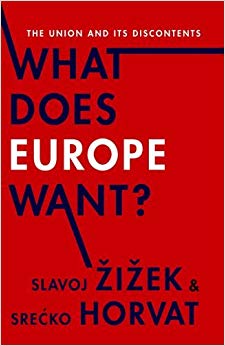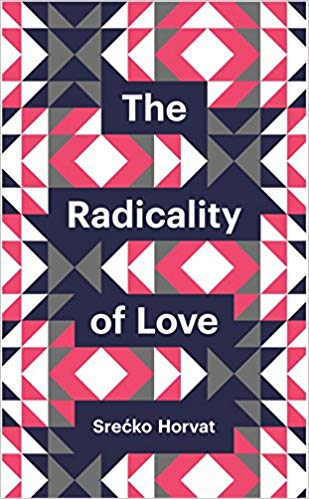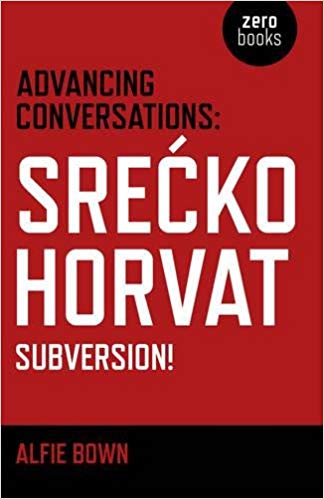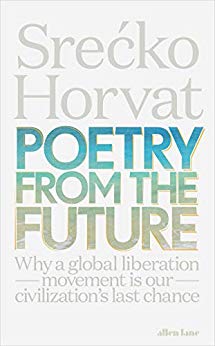Background
Srećko Horvat was born on February 28, 1983, in Osijek, Croatia, but lived for the first eight years of his life in exile in Germany.

Ul. Ivana Lučića 3, 10000, Zagreb, Croatia
Srećko received a degree in philosophy and general linguistics from The University of Zagreb.
Croatia
Srećko Horvat
Croatia
Srećko Horvat
Croatia
Srećko Horvat
Croatia
Srećko Horvat
Croatia
Yanis Varoufakis and Srećko Horvat
Croatia
Srećko Horvat
Croatia
Brainwash Festival (Horvat is in the middle)
Croatia
Srećko Horvat and Yanis Varoufakis
Croatia
Srećko Horvat












(To general observers, the European Union's economic woes ...)
To general observers, the European Union's economic woes appear to be its greatest problem, but the real peril is an ongoing ideological-political crisis that threatens an era of instability and reactionary brutality. The fall of communism in 1989 seemed to end the leftist program of universal emancipation. However, nearly a quarter of a century later, the European Union has failed to produce any coherent vision that can mobilize people to action.
https://www.amazon.com/What-Does-Europe-Want-Insurrections/dp/0231171072/?tag=2022091-20
2014

(What would happen if we could stroll through the revoluti...)
What would happen if we could stroll through the revolutionary history of the 20th century and, without any fear of the possible responses, ask the main protagonists - from Lenin to Che Guevara, from Alexandra Kollontai to Ulrike Meinhof - seemingly naïve questions about love? Although all important political and social changes of the 20th century included heated debates on the role of love, it seems that in the 21st century of new technologies of the self we are faced with a hyperinflation of sex, not love.
https://www.amazon.com/Radicality-Love-Theory-Redux-dp-0745691145/dp/0745691145/?tag=2022091-20
2015

(This volume offers a profound analysis of post-socialist ...)
This volume offers a profound analysis of post-socialist economic and political transformation in the Balkans, involving deeply unequal societies and oligarchical “democracies.” The contributions deconstruct the persistent imaginary of the Balkans, pervasive among outsiders to the region, who see it as no more than a repository of ethnic conflict, corruption and violence.
https://www.amazon.com/Welcome-Desert-Post-Socialism-Politics-Yugoslavia/dp/1781686211/?tag=2022091-20
2015

(In a world dominated by capitalism which is dangerously s...)
In a world dominated by capitalism which is dangerously sliding into a new kind of fascism, Srećko Horvat's new book explores the concept of subverting the dominant paradigm in politics, technology and love.
https://www.amazon.com/Advancing-Conversations-Srecko-Horvat-Subversion/dp/1785354965/?tag=2022091-20
2017

(The past is forgotten, and the future is without hope. Dy...)
The past is forgotten, and the future is without hope. Dystopia has become a reality. This is the new normal in our apocalyptic politics - but if we accept it, our helplessness is guaranteed. To bring about real change, argues activist and political philosopher Srecko Horvat, we must first transform our mindset.
https://www.amazon.com/Poetry-Future-Liberation-Movement-Civilisations-ebook/dp/B07KSNMT2B/?tag=2022091-20
2019
journalist philosopher Political activist writer
Srećko Horvat was born on February 28, 1983, in Osijek, Croatia, but lived for the first eight years of his life in exile in Germany.
Srećko received a degree in philosophy and general linguistics from The University of Zagreb.
After graduation Horvat started writing for Croatian magazines such as Zarez. Today he writes regularly for leading media, including The Guardian, Al Jazeera, Der Spiegel and The New York Times. He also has published more than 10 books, which were translated into more than 15 languages, including Chinese, Korean, Spanish, Turkish, German and others. His books and essays mostly deal with capitalism-critical movements, emancipation and the development of Europe. Together with Slavoj Žižek, he published the book What Does Europe Want? The Union and Its Discontents. His most recent work, a radical manifesto for hope in democracy, union and internationalism: Poetry for the Future, was published in May 2019.
In 2008 Horvat co-founded the Subversive Festival, where he served as program director until 2013. It was a forum for socio-political issues in Southeast Europe. The influence and significance of the Subversive Festival was often paralleled to the Praxis School, the Marxist humanist philosophical movement that originated in the SFR Yugoslavia, during the 1960s.
Horvat was the host and author of an intellectual TV show on Croatian National Television called Zdravo Društvo during 2013, which tried to recreate the Balkan cultural space and hosted many intellectuals such as Renata Salecl, Rade Šerbedžija, Andrej Nikolaidis, Viktor Ivančić, and others. But in 2014 he lost his TV show because of his radical views.
In 2014 Horvat launched a project called Philosophical Theatre at Croatian National Theatre in Zagreb. The underlying idea was to reestablish the close relationship between philosophy and theatre. It runs as a monthly series of public debates with thinkers and artists.
(What would happen if we could stroll through the revoluti...)
2015(To general observers, the European Union's economic woes ...)
2014(In a world dominated by capitalism which is dangerously s...)
2017(This volume offers a profound analysis of post-socialist ...)
2015(The past is forgotten, and the future is without hope. Dy...)
2019Horvat is regarded as one of the "central figures of the new left in post-Yugoslavia". He has participated in different activist movements across the world, including the 2009 student protests in Croatia, Occupy Wall Street in 2011, and World Social Forum in Senegal and Tunisia. Since 2016 Horvat has been claiming that "the need for a progressive international movement was never as urgent as today." He is actively involved in the Democracy in Europe 2025 movement and was one of its founders along with Yanis Varoufakis in 2016.
